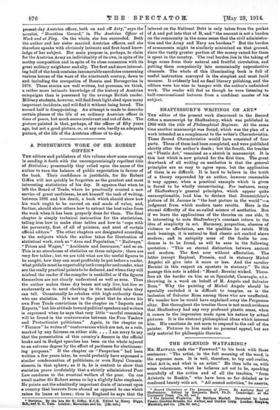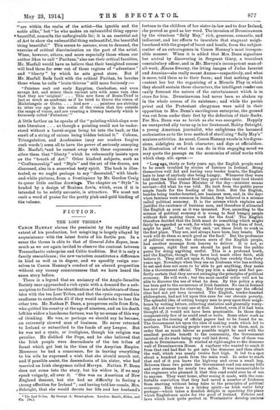THE SPLENDID WAYFARING4
MACFALL ends the "Foreword" to 'his book with these sentences : " The artist, in the full meaning of the word, is the supreme man. It is well, therefore, to try and realize, what Art is, and what is an artist" He then tells us, with some vehemence, what he believes art' not to be, speaking scornfully of the critics and of all the teachers, " from Aristotle to Ruskin," who have been so' far deluded as 'to confound beauty with art. "All sensed activities," he asserts, • Second Characters or The. Language of Forms. By Anthony Earl of Shot tesbury. Edited by Benjamin Band, Ph.D. Cambridge at the 7Joiversity Press. [7s. 6& bet.] t The Splendid Wayfaring. By Haldane Maetall. Decorated by Lone Fraser, Gaudier-Seasnk% the Author; sad Gordon Cigdg. Leaden atroptia, hisrstual, sad Co, ElOs. 6d. eat.
4. are within the realm of the artist—the ignoble and the noble alike," but "he who makes an unbeautiful thing appear
sobeautiful, commits the unforgivable it is an essential act of Art to show the unbeautiful thing unbeautiful, the beautiful thing beautiful." This seems to assume, even to demand, the 'exercise of critical discrimination on the part of the artist. When, however, others, and more especially those whom our author likes to call " Puritans," also use their critical faculties, Mr. Macfall would have us believe that their benighted course will lead them for ever out of those regions of "adventure" and " liberty " by which he sets great store. But if Mr. Madan finds fault with the critical Puritan, be berates those whom he calls " brain-thieves " still more furiously :— "Painters seek out early Egyptian, Cambodian, and even Savage Art, and mimic these ancient arts with some vain idea that they are 'original.' . . . This new form of Brain-Thief is just as much an academic as if he tried to thieve the vision of Michelangelo or Giotto. . . . And now . . . painters are striving to utter our age in the realm of the vision that lies outside She range of vision, and are creating a literary bastardy which is fatuously called 'Futurism.'"
A little farther on he speaks of the "painting which slops over into literature . . . as though a painting could not be under- stood without a barrel-organ being let into the back, or the smell of a string of onions being hidden behind it." Cubism, Triangulation, and Academism (may our readers forgive such words !) seem all to have the power of seriously annoying Mr. Macfall,•and he cannot away with these exponents or allow them that " liberty " which he vehemently insists upon as the "breath of Art." Other kindred subjects, such as " Craftsmanship" and "Style" and the art of the drama, are discussed, also in a somewhat testy spirit. The book is illus- trated, or we ought perhaps to say "decorated," with black- and-white pictures, from a frontispiece by Mr. Gordon Craig to queer little outline drawings. The chapter on "Style" is headed by a design of Brahma fowls, which, even if it is intended to be subtly sarcastic, is attractive. We must not omit a word of praise for the pretty pink-and-gold binding of the volume.















































 Previous page
Previous page